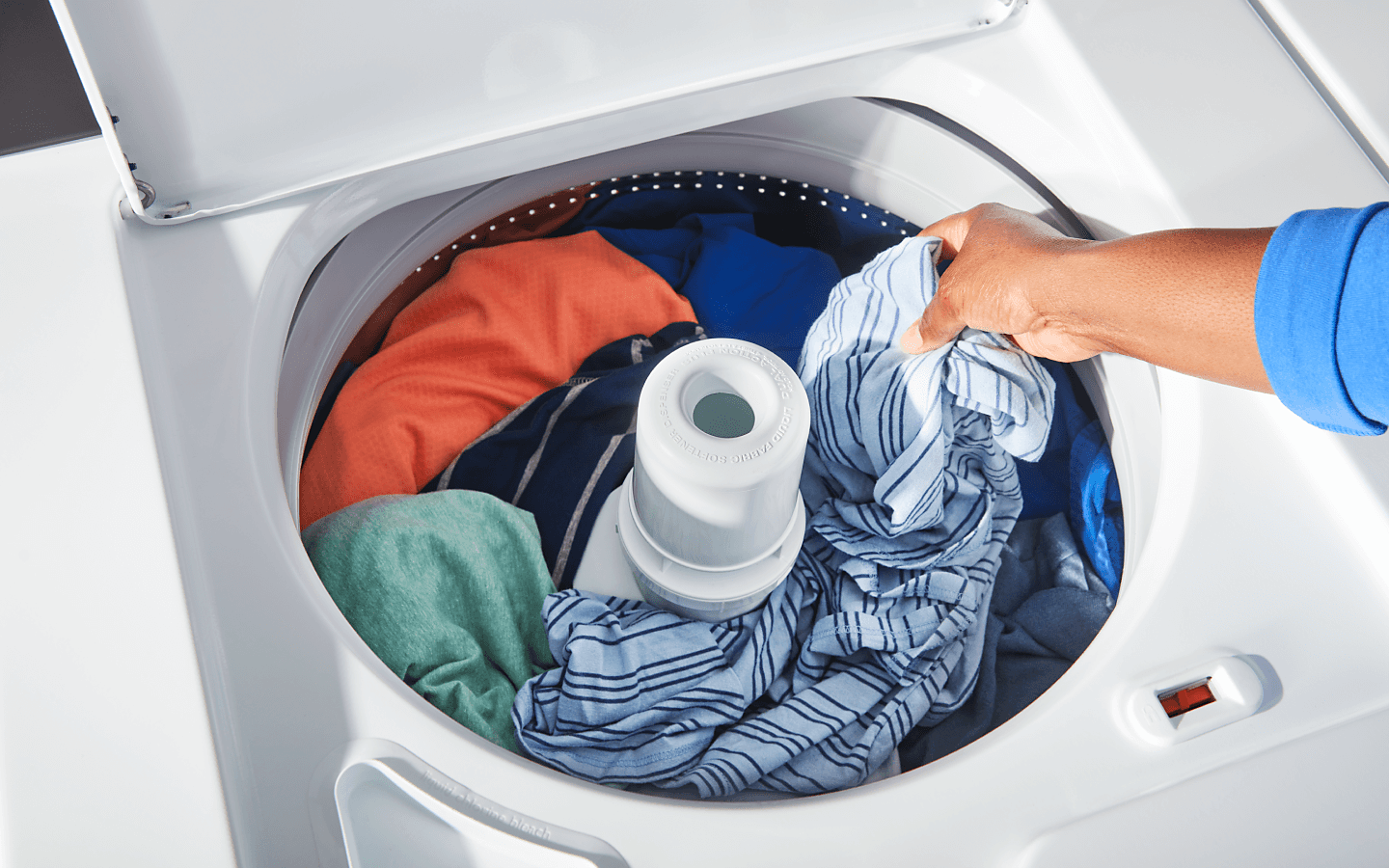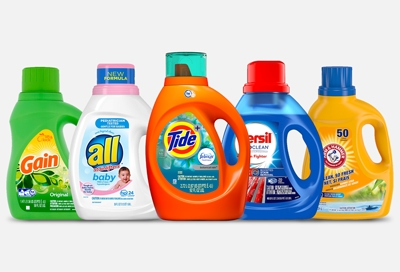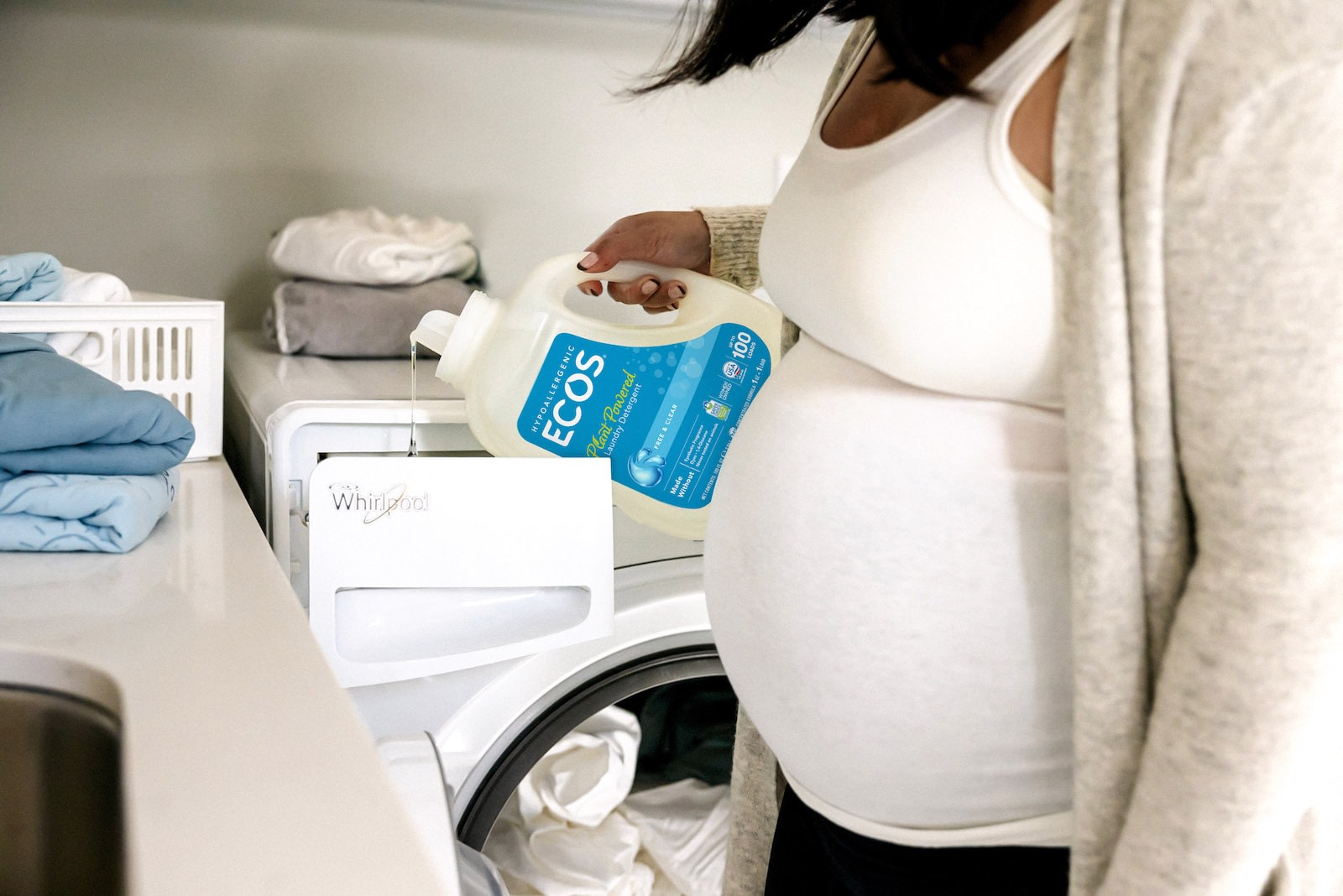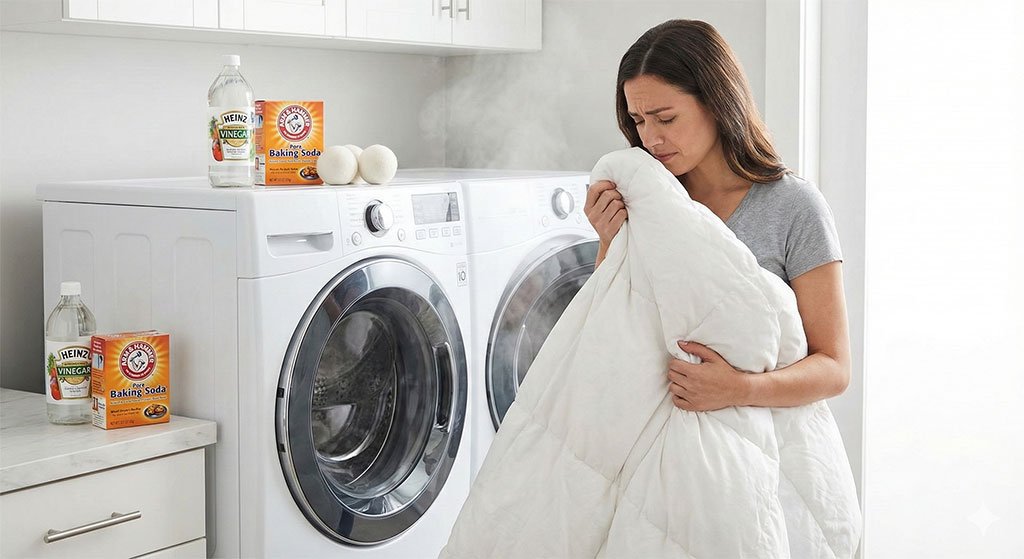Liquid detergent does not inherently damage washing machines when used correctly. Excessive amounts of detergent, however, can lead to issues.
Care for your washing machine starts with selecting the right detergent. Liquid detergents are formulated to dissolve fully in water, ensuring that no residues clog up your machine’s inner workings. Over time, correct usage helps maintain the efficiency and longevity of your appliance.
Whether you own a front-loading or top-loading washer, observing the recommended amount of detergent is crucial. These detergents typically also prevent the build-up of limescale, which is beneficial for the health of your washing machine. Always check the manufacturer’s guidelines for the appropriate detergent type and usage for your specific model to safeguard its functionality over time. Remember, being diligent with your liquid detergent usage can contribute significantly to a well-maintained washing machine.

Liquid Detergent And Washing Machines
When it comes to laundry, the choice of detergent is crucial. Liquid detergents are popular for their ease of use and efficiency in cleaning clothes. Yet, some users worry about their long-term effects on washing machines. Let’s explore the popularity of liquid detergents and address common concerns.
Liquid Detergent Popularity
Liquid detergents have taken center stage in many households. Their ability to dissolve quickly and completely makes them a top choice. They also offer pre-treatment convenience for stains and are less likely to leave residues on clothes. Here’s why they are so popular:
- Easy to measure and pour
- Dissolves well in any water temperature
- Effective in stain removal
- Various options for sensitive skin
Common Concerns About Liquid Detergents
Some users hesitate to use liquid detergents frequently. Concerns arise about the potential harm they could cause to machines. Misconceptions may lead to worry, but the facts clear the air:
- Liquid detergents are safe for all types of washing machines.
- Using the recommended amount prevents excess suds.
- Regular maintenance prevents any detergent-related issues.
Always check the manual for your specific machine and follow the manufacturer’s guidelines to avoid any problems. Thus, liquid detergents, when used properly, do not damage washing machines.
Composition Of Liquid Detergents
Understanding what makes up liquid detergents is crucial. It is the first step to learning if they are safe for washing machines. Many brands fill the shelves, and each formula varies. But certain elements are common in most detergents. Let’s break down these ingredients.
Key Ingredients
Liquid detergents comprise several key components. Each plays a role in cleaning clothes effectively. The common ingredients include:
- Surfactants: These are the cleaning heroes. They pull dirt from fabrics.
- Enzymes: They tackle protein-based stains like blood and grass.
- Builders: These soften water to boost cleaning power.
- Fragrances: For that fresh laundry scent.
- Preservatives: They keep the detergent stable and safe to use.
Potential Harmful Chemicals
Despite their cleaning potential, some liquid detergents carry risks. Harmful chemicals in certain formulas could affect the machine’s longevity. A brief look at these substances reveals:
Chemical | Possible Effects |
|---|---|
Chlorine Bleach | Corrosion of metal parts |
Phosphates | Building up in pipes |
Dyes | Staining of washer components |
Formaldehyde | Reducing machine life |
Using detergents with these chemicals sparingly can protect your machine. Opting for eco-friendly detergents can be a safer choice for your appliance.
The Mechanics Of Washing Machines
Understanding the mechanics behind your washing machine can help you take better care of it. Let’s dive into how your machine works and what parts could be at risk.How Washing Machines Work
How Washing Machines Work
Washing machines seem complicated, but they’re quite simple.
- You put in dirty laundry.
- You add detergent.
- The machine fills with water, mixes it with detergent, and soaks your clothes.
- Agitators or paddles move to clean the contents.
- Spin cycles wring water out.
- Clean clothes get ready for the dryer or clothesline.
Components at Risk
Components At Risk
Some parts may suffer from improper detergent use:
Component | Function | Risk |
|---|---|---|
Drum | Holds clothes | Residue build-up |
Pump | Removes water | Clogs from excess suds |
Hoses | Transports water | Detergent damage |
Seals and Gaskets | Prevents leaks | Erosion from chemicals |
Impact On Washing Machine Lifespan
The lifespan of a washing machine is crucial to consider. Common laundry debates often involve the impact of detergents on appliances. The truth needs unveiling. Does liquid detergent harm washing machines over time? Let’s explore how it might.
Corrosion And Residue Buildup
Washing machines and liquid detergents should be friends. Yet, the relationship can sour. Liquid detergent may leave residue. This residue can cause corrosion.
Residue often hides in hidden corners or flows in pipes. It traps moisture. Moisture can lead to rust. This can weaken parts. The damage might not be immediate. But over time, it can be significant.
Wear And Tear From Chemicals
All detergents have chemicals. Some have more than others. Harsher chemicals in liquid detergents can cause wear and tear.
- Chemicals can degrade rubber seals.
- They can attack the metal drum.
- Components like pumps and heaters might fail sooner.
Regular maintenance can fight back. Use manufacturer-recommended detergents. This can help protect against damage. It can prolong the life of your machine.
Proper Usage Of Liquid Detergents
We often wonder about liquid detergent and our beloved washing machines. Can the one harm the other? Rest assured, using liquid detergent correctly will keep your machine in top shape. Let’s look at how to use them right.
Recommended Amounts
Knowing the right amount of liquid detergent to use can prevent damage to your machine. Here’s a quick guide:
Load Size | Amount of Detergent |
|---|---|
Small | 1 ounce |
Medium | 2 ounces |
Large | 3 ounces |
Check your detergent’s label for specific guidelines. Use a measuring cap to ensure accuracy.
Frequency Of Use
Too much detergent can lead to buildup and malfunctions.
- Regular washes: Stick to the amount as per load size.
- Heavily soiled items: A small extra dose may be necessary.
- Daily usage: Follow machine and detergent instructions closely.
Balance is key. Regular maintenance will keep your machine running smooth.

Credit: www.samsung.com
Cleaning And Maintenance Tips
Concern about liquid detergents damaging washing machines is common. Proper upkeep ensures longevity and top performance. Below are essential maintenance tips for every machine owner.
Regular Cleaning Cycles
Run monthly cleaning cycles without clothes to keep your washing machine in prime condition. Use hot water and add a cup of white vinegar or a washing machine cleaner. This eliminates odor-causing bacteria and buildup. Maintain the cleanliness of the drum and gaskets.
Removing Detergent Residues
Check and clean the detergent drawer regularly. Soap residue can cause mold. Use a damp cloth to wipe the drawer and the cavity. A mixture of hot water and vinegar ensures a thorough clean. Follow with a dry cloth to remove moisture.
- Clean filters to prevent clogs.
- Wipe down the drum, door, and gaskets.
- Ensure proper detergent dosage for machine efficiency.
Task | Frequency | Method |
|---|---|---|
Detergent Drawer | Monthly | Wipe with vinegar mix |
Drum Cleaning | Monthly | Clean cycle with vinegar |
Filter Maintenance | Every 3-6 Months | Check and clean out |
Alternative Cleaning Agents
When it comes to washing clothes, the right detergent matters. Some worry that liquid detergents harm machines. Fear not! Options exist that keep your washer safe. Let’s explore kinder alternatives.
Eco-friendly Options
Green detergents mean clean clothes without harsh chemicals. These detergents are gentle on your washer and the environment. Brands design them to avoid residue that could damage machines. A win for Earth and your laundry essentials!
- Plant-based ingredients
- No synthetic fragrances
- Biodegradable packaging
Diy Natural Detergents
Make your own detergents! It’s easy, fun, and safe for washers. You control what goes in, ensuring it’s mild for your machine. Try these ingredients:
- Baking soda
- Washing soda
- Natural soap
Mix them and say goodbye to chemical build-up. Your washer will thank you!
Expert Opinions And Research Findings
Many wonder if liquid detergent can harm their washing machines. Let’s explore what the experts say and what research has revealed.
Studies On Detergent Effects
Recent studies shed light on how different detergents affect washing machines. We looked into numerous reports from appliance experts.
- Machine Lifespan: Research suggests that the proper detergent in correct amounts should not damage washing machines.
- Detergent Build-up: Liquid detergents can sometimes leave residue. This build-up might lead to maintenance issues over time.
- Component Wear: Without regular cleaning, any detergent can contribute to faster wear of machine parts.
Professional Recommendations
Following professional advice can help ensure your machine stays in peak condition. Here’s what the professionals say:
Type of Detergent | Guideline |
|---|---|
Liquid Detergent | Use the recommended amount and regularly clean the machine. |
Powder Detergent | May be better for high-efficiency washers and hard water. |
Pods/Packets | Convenient but follow the manufacturer’s loading instructions. |
It’s important to refer to your machine’s manual. Remember that too much detergent can cause as many problems as too little.
Choosing The Right Detergent For Your Machine
Using the correct detergent keeps your washing machine running smoothly. The wrong choice can cause residue buildup. Over time, this affects your machine’s efficiency and lifespan.
Types Of Detergents
The market offers various detergents suited for different wash cycles and fabric types. Understanding these options is vital to protect your machine.
- Powder Detergents: Great for white clothing and heavy stains.
- Liquid Detergents: Ideal for pretreating and colorful garments.
- Pods/Packs: Convenient, premeasured with minimal mess.
- High-Efficiency (HE) Detergents: Designed for HE machines, low-sudsing.
Matching Detergent To Machine Type
Pair your detergent with your machine’s design to prevent damage. Read the manual to confirm what’s best.
Machine Type | Suggested Detergent |
|---|---|
Traditional Top Load | Powder or Liquid |
High-Efficiency Front Load | HE Liquid |
High-Efficiency Top Load | HE Powder or Liquid |
Always use HE detergents for HE machines to prevent damage from excess suds.
Consumer Reports And Reviews
Exploring how liquid detergents affect washing machines involves sifting through countless consumer reports and reviews. Users share their real-world experiences, underlining the importance of selecting the right detergent for machine longevity. Brand performance reviews further guide consumers. Our insights dive into user testimonies and brand reliability, providing a clearer picture for your laundry routine.
User Experiences With Liquid Detergents
User feedback on liquid detergent impact is invaluable. Many report that using the correct amount is crucial. Overusing can lead to residue buildup and unpleasant odors. Proper maintenance, such as regular cleaning cycles, mitigates these issues. Some users suggest that liquid detergents are more gentle on machines, with fewer instances of clogs compared to powders.
- No damage when following manufacturer guidelines
- Residue can be prevented with proper dosages
- Clean cycles help maintain machine health
- Gentler on machines, as reported by several users
Brand Performance And Reliability
Brand reputation plays a vital role in detergent choice. Reviews frequently praise certain brands for their machine-friendly formulas. In contrast, others may stress components causing wear and tear. This table highlights brands based on performance and reliability.
Brand Name | User Rating | Machine Safety |
|---|---|---|
Brand A | 4.5/5 | High |
Brand B | 4.0/5 | Moderate |
Brand C | 3.5/5 | Low |
In summary, these results reflect that not all liquid detergents are created equal. Careful choice based on brand performance can lead to better results. Always consult your washing machine’s manual to ensure compatibility with your chosen detergent.

Credit: www.ecos.com
Frequently Asked Questions
Does Liquid Detergent Ruin Washing Machines?
No, liquid detergent does not ruin washing machines when used according to the manufacturer’s instructions. Regular maintenance is key to prevent any damage.
Is It Better To Use Liquid Or Powder Detergent In Washing Machine?
Both liquid and powder detergents are effective in washing machines. Liquid is better for oily stains, while powder excels with outdoor dirt. Choose based on your specific laundry needs.
Can I Use Liquid Detergent In My Washing Machine?
Yes, you can use liquid detergent in your washing machine. Always follow the manufacturer’s guidelines for the correct usage amount.
What Type Of Laundry Detergent Is Best For Washing Machine?
High-efficiency (HE) laundry detergents are best for modern washing machines. They produce fewer suds and ensure efficient cleaning without damaging your machine.
Conclusion
To sum up, the right liquid detergent won’t harm your washing machine. Use manufacturer-recommended options to ensure longevity. Overuse leads to buildup and potential damage, so measure correctly. For optimal machine health, balance detergent type and quantity with regular maintenance.
Embrace smart laundry habits for worry-free washing.


